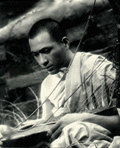During the final days of the Second World War, a weary Japanese regiment is sent on a military campaign to Burma. Far from zealous, determined career soldiers, the troop consists of ordinary, dutiful civilians led by a thoughtful music teacher named Captain Inouye (Rentaro Mikune). In order to improve morale and build camaraderie, Captain Inouye has taught the soldiers to sing as they make their way through the arduous Burmese jungle. One soldier, Corporal Mizushima (Shoji Yasui), has naturally taken to playing his handcrafted harp and provides the haunting melody. Arriving at a peasant village, the soldiers welcome the tranquility and hospitality of the community, only to realize that British soldiers have been surreptitiously observing them. In order to disguise their combat preparations, the soldiers sing “Home Sweet Home” while donning their military equipment. But during a brief pause, they realize that the British soldiers have joined in their melancholic, universal harmony. The war is over. The Japanese have surrendered. The British soldiers have come to escort the troop to a Prisoner of War camp in Mudon. However, Mizushima is asked to perform a final mission: to persuade a group of Japanese soldiers hiding in the mountains to surrender. The task proves to be impossible, and the fortress is attacked. Mizushima is critically wounded, but is nursed back to health by a Buddhist priest. Now clad in a monastic robe instead of a military uniform, Mizushima sets out to reunite with his regiment, only to find a solemn, urgent personal calling that leads him further away from his friends and beloved homeland.
The Burmese Harp is a haunting, poignant and serenely indelible examination of the aftermath of war. The film opens with the spare, enigmatic words: In Burma, soil is red, so are rocks. Using landscape as a metaphor for the isolation and suffering of the soul, Kon Ichikawa contrasts the chaotic, harsh realities of war with the tranquil expanse of nature: the mountain fortress attack; the discovery of a body leaning against a tree in the jungle; the mass burial of soldiers along the shoreline. Symbolically, Mizushima’s spiritual transformation is reflected in a scene where the troop assembles for choral practice at a religious site, as Mizushima rests inside the hull (the figurative soul) of a Buddha statue. It is a reflection of his own enlightenment and sense of purpose after witnessing a great and senseless tragedy – a transcendence beyond his spiritual captivity – towards a lonely, indefinite journey, guided solely by humanity and personal conscience.
© Acquarello 2000. All rights reserved.
